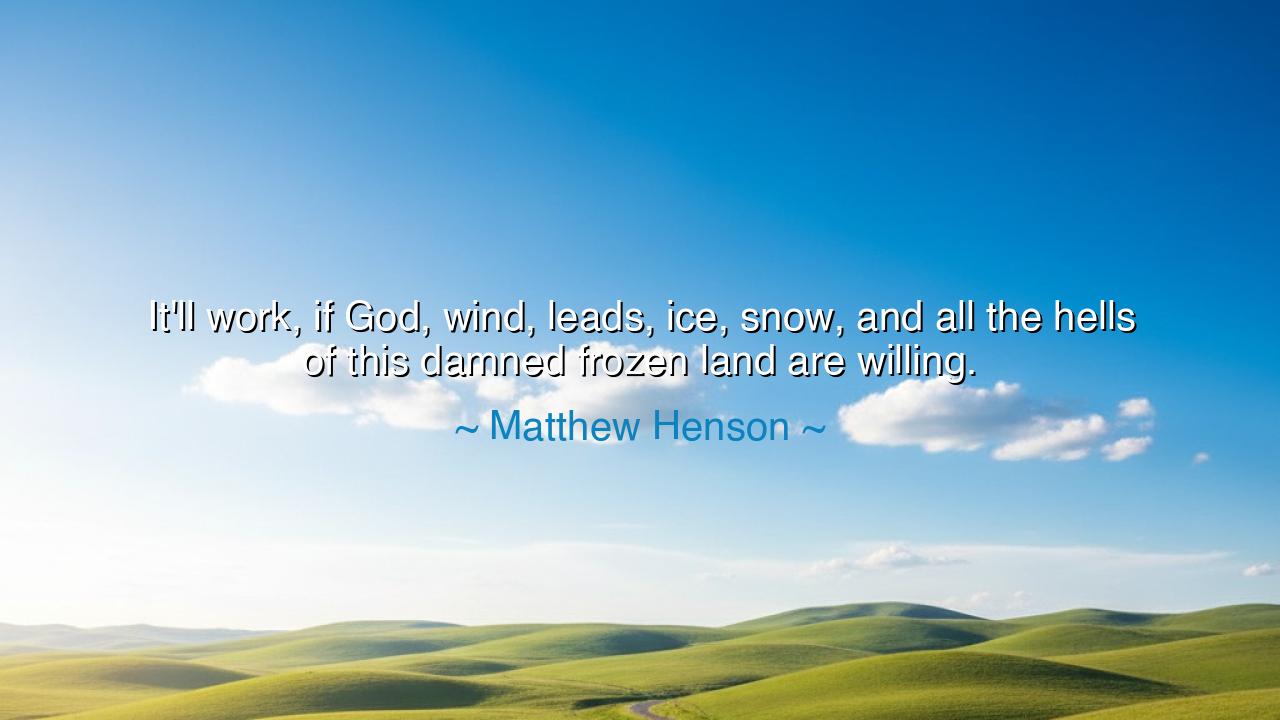
It'll work, if God, wind, leads, ice, snow, and all the hells of
It'll work, if God, wind, leads, ice, snow, and all the hells of this damned frozen land are willing.






The intrepid explorer Matthew Henson spoke these words amidst the vast, merciless wilderness of the Arctic: “It’ll work, if God, wind, leads, ice, snow, and all the hells of this damned frozen land are willing.” In this utterance lies the spirit of all great journeys, a recognition that human ambition, though fierce, is but a fragile flame against the immense forces of nature and fate. His words echo with reverence and defiance, for they are both a prayer and a challenge to the world itself.
To say, “if God is willing,” is to acknowledge the divine hand that governs the unknown. No matter how carefully plans are laid, the outcome rests upon powers beyond mortal control. Yet Henson does not invoke God alone. He names the wind, the ice, and the snow as living forces, ancient and wild, capable of granting passage or bringing ruin. In doing so, he honors nature as both ally and adversary, a realm to be respected, not conquered.
The mention of hells speaks to the torment of exploration—the biting cold, the endless darkness, the gnawing hunger, and the ever-present specter of death. These are the trials that test not only the body but also the spirit. Henson’s words reveal a truth known to all who tread the edge of the world: success is never certain, for it depends upon harmony between human will and the vast, indifferent powers of the earth.
This quote was born in an age when men sought to touch the last uncharted places, to plant their flag where no foot had trod. Henson himself, a man of unparalleled courage, journeyed to the very roof of the world, the North Pole, enduring hardships few could imagine. His statement reflects not only the physical dangers of his quest but also the humility of one who knows that survival is a gift, not a guarantee.
Thus, let these words endure as a testament to all who dare to dream: even the mightiest plans rely upon forces unseen. Strive with all your strength, but remember always the power of God, the wildness of the wind, and the unpredictable paths of ice and snow. For in the dance between human will and nature’s vastness lies the fate of every great endeavor.






MTDo Minh Tuan
This quote by Matthew Henson speaks to the intersection of human ambition and the uncontrollable forces of nature. There’s a certain poetic realism in it. It makes me wonder—how many of our own goals are dependent on forces beyond us, and how do we reconcile our efforts with the randomness of the world? Is it liberating to realize not everything is within our control, or does it bring uncertainty to the path we’re walking?
VTVu The
Matthew Henson’s quote suggests a sense of uncertainty and respect for the power of nature. It feels like a reminder that no matter how prepared we are, success is often about timing, luck, and a bit of grace. How do we cope with the lack of control over external factors? Should we stop trying to predict or control outcomes, and instead, focus on making the best of whatever comes our way, no matter the circumstances?
NTNguyen Truc
Henson’s quote reflects the balance between human determination and the powerful forces of nature. It's a humbling reminder that despite all our efforts, we may not succeed unless the conditions align. How do we maintain motivation when we realize some factors are out of our hands? Is there a way to navigate life with the awareness that certain things are just not ours to control, yet still pursue our goals relentlessly?
CNTran Thi Cam Nhung
Matthew Henson’s words highlight the unpredictability and the immense challenges faced in his explorations. There’s a sense of surrender and faith in his statement. It makes me think—how often do we try to control every aspect of our lives, when in reality, some things are simply beyond our influence? Is there strength in acknowledging these forces, or does it make us feel small and helpless against the enormity of the world around us?
GDGold D.dragon
This quote by Matthew Henson speaks to resilience and the acknowledgement that success doesn’t solely depend on personal effort. What does it mean to surrender to the forces around us while still pushing forward with determination? Does it feel empowering to embrace the uncertainty of the world, or does it introduce fear? How do we reconcile our own drive with the acceptance of forces that may disrupt or hinder our progress?